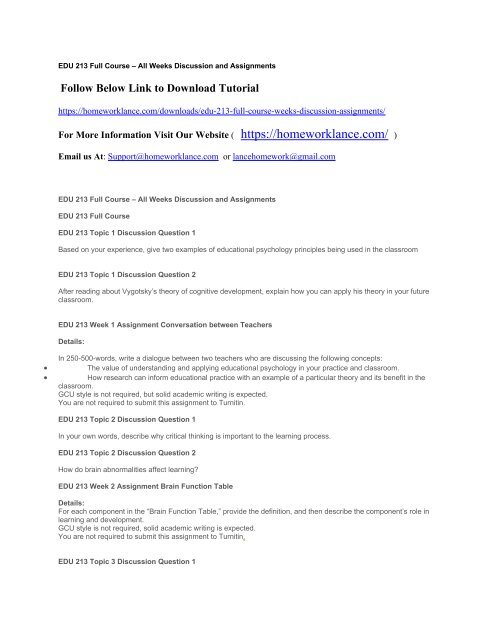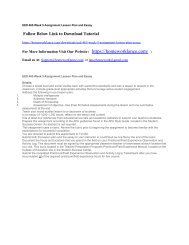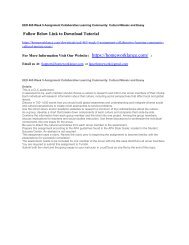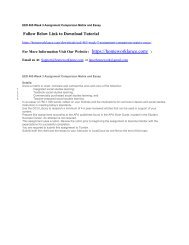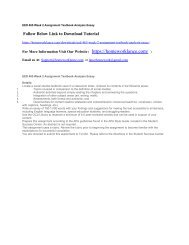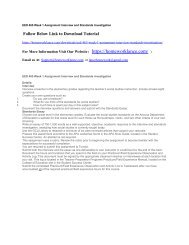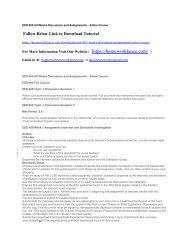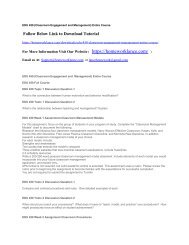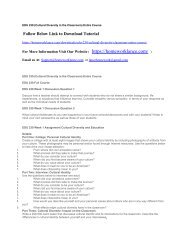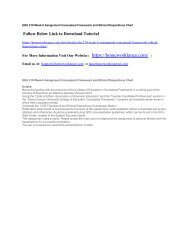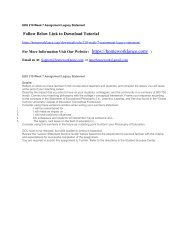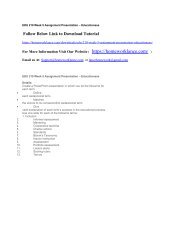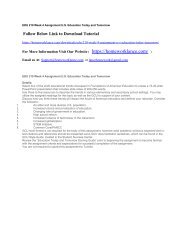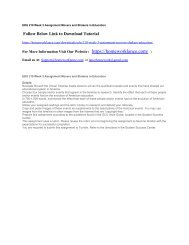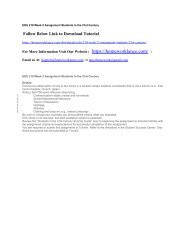EDU 213 Full Course – All Weeks Discussion and Assignments
Create successful ePaper yourself
Turn your PDF publications into a flip-book with our unique Google optimized e-Paper software.
<strong>EDU</strong> <strong>213</strong> <strong>Full</strong> <strong>Course</strong> <strong>–</strong> <strong>All</strong> <strong>Weeks</strong> <strong>Discussion</strong> <strong>and</strong> <strong>Assignments</strong><br />
Follow Below Link to Download Tutorial<br />
https://homeworklance.com/downloads/edu-<strong>213</strong>-full-course-weeks-discussion-assignments/<br />
For More Information Visit Our Website ( https://homeworklance.com/ )<br />
Email us At: Support@homeworklance.com or lancehomework@gmail.com<br />
<strong>EDU</strong> <strong>213</strong> <strong>Full</strong> <strong>Course</strong> <strong>–</strong> <strong>All</strong> <strong>Weeks</strong> <strong>Discussion</strong> <strong>and</strong> <strong>Assignments</strong><br />
<strong>EDU</strong> <strong>213</strong> <strong>Full</strong> <strong>Course</strong><br />
<strong>EDU</strong> <strong>213</strong> Topic 1 <strong>Discussion</strong> Question 1<br />
Based on your experience, give two examples of educational psychology principles being used in the classroom<br />
<strong>EDU</strong> <strong>213</strong> Topic 1 <strong>Discussion</strong> Question 2<br />
After reading about Vygotsky’s theory of cognitive development, explain how you can apply his theory in your future<br />
classroom.<br />
<strong>EDU</strong> <strong>213</strong> Week 1 Assignment Conversation between Teachers<br />
Details:<br />
<br />
<br />
In 250-500-words, write a dialogue between two teachers who are discussing the following concepts:<br />
The value of underst<strong>and</strong>ing <strong>and</strong> applying educational psychology in your practice <strong>and</strong> classroom.<br />
How research can inform educational practice with an example of a particular theory <strong>and</strong> its benefit in the<br />
classroom.<br />
GCU style is not required, but solid academic writing is expected.<br />
You are not required to submit this assignment to Turnitin.<br />
<strong>EDU</strong> <strong>213</strong> Topic 2 <strong>Discussion</strong> Question 1<br />
In your own words, describe why critical thinking is important to the learning process.<br />
<strong>EDU</strong> <strong>213</strong> Topic 2 <strong>Discussion</strong> Question 2<br />
How do brain abnormalities affect learning?<br />
<strong>EDU</strong> <strong>213</strong> Week 2 Assignment Brain Function Table<br />
Details:<br />
For each component in the “Brain Function Table,” provide the definition, <strong>and</strong> then describe the component’s role in<br />
learning <strong>and</strong> development.<br />
GCU style is not required, solid academic writing is expected.<br />
You are not required to submit this assignment to Turnitin.<br />
<strong>EDU</strong> <strong>213</strong> Topic 3 <strong>Discussion</strong> Question 1
What is diversity in the sense of self <strong>and</strong> social development? How do you think it influences a person’s positive<br />
social-developmental outcomes such as trust, moral development, <strong>and</strong> social competence?<br />
<strong>EDU</strong> <strong>213</strong> Topic 3 <strong>Discussion</strong> Question 2<br />
The text claims that students from some ethnic groups are more comfortable working in a cooperative rather than in a<br />
competitive environment. Why do you think some teachers encourage competition among their students?<br />
<strong>EDU</strong> <strong>213</strong> Week 3 Assignment Stages of Social Development<br />
Details:<br />
In a 500-750-word essay, discuss the following:<br />
1. Describe the various stages of social development.<br />
2. What role does social development play in how you teach?<br />
3. How does a teacher promote a positive sense of self in the classroom?<br />
4. Based on your own experience, what is the teacher’s role in moral <strong>and</strong> prosocial development in the<br />
classroom?<br />
Use 3-5 scholarly resources.<br />
Prepare this assignment according to the guidelines found in the GCU Style Guide, located in the Student Success<br />
Center.<br />
This assignment uses a rubric. Please review the rubric prior to beginning the assignment to become familiar with the<br />
expectations for successful completion.<br />
You are required to submit this assignment to Turnitin. Refer to the directions in the Student Success Center.<br />
<strong>EDU</strong> <strong>213</strong> Topic 4 <strong>Discussion</strong> Question 1<br />
Where do you st<strong>and</strong> on the nature versus nurture debate? Explain.<br />
<strong>EDU</strong> <strong>213</strong> Week 4 Topic 4 <strong>Discussion</strong> Question 2<br />
Max Points: 5.0<br />
Based on your readings, are children who reach developmental milestones (walking, talking) earlier than their peers<br />
the same ones who have higher academic ability in later years? Explain your answer using the principles of physical,<br />
cognitive, <strong>and</strong> linguistic development.<br />
<strong>EDU</strong> <strong>213</strong> Week 4 Assignment The Process of Learning<br />
Details:<br />
The process of learning begins with experiences that are etched upon the brain. The brain is an organ of learning,<br />
<strong>and</strong> learning is biological. The purpose of this project is to explore the brain as it relates to learning <strong>and</strong> teaching.<br />
You are a new teacher in a public school. Your administrator has asked you to give a presentation about the learning<br />
process to your students’ parents.<br />
Create a PowerPoint presentation using 15-25 slides that respond to the items below:<br />
1. What does it mean when we say the best predictor of a child’s learning is what they already know?<br />
2. Explain in detail how we learn.<br />
3. Explain the teachers <strong>and</strong> parents roles in teaching <strong>and</strong> learning.<br />
4. How are teaching <strong>and</strong> learning connected?<br />
5. Explain the inclusion classroom <strong>and</strong> language to be used according to IDEA.<br />
6. Select a cognitive, social or behavioral disability/challenge, then define the disability/challenge <strong>and</strong> explain<br />
two things the teacher could do to support a student with that particular disability/challenge in the classroom.<br />
The slides should be appealing <strong>and</strong> use key words <strong>and</strong> phrases, as well as diagrams <strong>and</strong> pictures.<br />
Make sure to use the Notes section or a separate document to script what you will say in your presentation. Without<br />
the script, your assignment will be incomplete.<br />
While GCU style format is not required for the body of this assignment, solid academic writing is expected, <strong>and</strong> in-text<br />
citations <strong>and</strong> references should be presented using GCU documentation guidelines, which can be found in the GCU<br />
Style Guide, located in the Student Success Center.
This assignment uses a rubric. Please review the rubric prior to beginning the assignment to become familiar with the<br />
expectations for successful completion.<br />
<strong>EDU</strong> <strong>213</strong> Topic 5 <strong>Discussion</strong> Question 1<br />
Max Points: 5.0<br />
Explain how basic human needs can affect student motivation <strong>and</strong> give an example.<br />
<strong>EDU</strong> <strong>213</strong> Topic 5 <strong>Discussion</strong> Question 2<br />
Some teachers use extrinsic motivators to encourage students, while others nurture students’ autonomy <strong>and</strong> apply<br />
intrinsic motivators. Which approach do you believe is most effective for learning outcomes? Why?<br />
<strong>EDU</strong> <strong>213</strong> Week 5 Assignment Motivating Students<br />
Details:<br />
For this assignment, you will be writing an article for a well-known educational publication. Tailor your article for one<br />
of the three grade levels: birth to grade 3, grade 4 to grade 8, or high school students. In your article address the<br />
following concepts:<br />
1. The importance of motivation in education <strong>and</strong> student learning.<br />
2. How student motivation can enhance performance.<br />
3. Examples of what a lack of motivation could look like.<br />
4. How intrinsic <strong>and</strong> extrinsic motivations differ.<br />
5. Factors that affect motivation.<br />
6. Recommend strategies to motivate students in the classroom.<br />
7. How teacher motivation affects student motivation.<br />
While GCU style format is not required for the body of this assignment, solid academic writing is expected, <strong>and</strong> in-text<br />
citations <strong>and</strong> references should be presented using GCU documentation guidelines, which can be found in the GCU<br />
Style Guide, located in the Student Success Center.<br />
You are not required to submit this assignment to Turnitin.<br />
<strong>EDU</strong> <strong>213</strong> Topic 6 <strong>Discussion</strong> Question 1<br />
Max Points: 5.0<br />
In your own words, what are the characteristics of a high-quality, effective student-teacher relationship? Would it<br />
differ at different grade levels, such as K-1, 2-3, 4-5, 6-8, or 9-12? Justify your response.<br />
<strong>EDU</strong> <strong>213</strong> Topic 6 <strong>Discussion</strong> Question 2<br />
As a classroom teacher, what strategies might you use to minimize <strong>and</strong>/or extinguish potentially aggressive behavior<br />
in the classroom?<br />
<strong>EDU</strong> <strong>213</strong> Week 6 Assignment Motivation Scenario<br />
Details:<br />
From the “Scenarios” document, choose one scenario <strong>and</strong> respond to the questions that relate to the scenario you<br />
selected.<br />
Write a 250-500-word essay on Motivation Response to the scenario that you chose. Be sure to identify the relevant<br />
theories <strong>and</strong> explain how you arrived at your conclusions.<br />
If you chose Scenario One, describe the following:<br />
1. Considering the motivation theories, explain Caitlin’s lack of motivation.<br />
2. In light of the behaviorist <strong>and</strong>/or social cognitive theories, identify three strategies Daran could employ to<br />
develop Caitlin’s motivation.<br />
3. Explain how Daran implements one of your suggestions <strong>and</strong> how Caitlin responds to Daran’s support.
In your response, use your knowledge of Maslow’s hierarchy of needs, achievement motivation, intrinsic, <strong>and</strong><br />
extrinsic motivation.<br />
Be sure to identify the relevant theories <strong>and</strong> explain how you arrived at your conclusions.<br />
If you chose Scenario Two, describe the following:<br />
1. Considering the motivation theories, explain Drew’s lack of motivation.<br />
2. In light of the behaviorist <strong>and</strong>/or social cognitive theories, identify three strategies Emily could employ to<br />
develop Caitlin’s motivation.<br />
3. Explain how Emily implements one of your suggestions <strong>and</strong> how Drew responds to Emily’s support.<br />
In your response, use your knowledge of attributions, entity versus incremental views of ability, <strong>and</strong> task-involved<br />
versus ego-involved learners.<br />
GCU style is not required, but solid academic writing is expected.<br />
This assignment uses a rubric. Please review the rubric prior to beginning the assignment to become familiar with the<br />
expectations for successful completion.<br />
You are not required to submit this assignment to Turnitin.<br />
<strong>EDU</strong> <strong>213</strong> Topic 7 <strong>Discussion</strong> Question 1<br />
Which types of assessments would students be more motivated to complete? Use the readings to defend your<br />
answer.<br />
<strong>EDU</strong> <strong>213</strong> Topic 7 <strong>Discussion</strong> Question 2<br />
What behaviors can teachers observe to informally determine whether their students are learning effectively <strong>and</strong><br />
achieving classroom objectives?<br />
<strong>EDU</strong> <strong>213</strong> Week 7 Assignment Evaluation Assignment<br />
Details:<br />
Create a student assessment to assess what you want the students to learn. This assignment can be any<br />
assessment type that was described in this week’s readings, which includes:<br />
1. Informal versus formal assessment <strong>–</strong> spontaneous versus planned purpose<br />
2. Paper-pencil versus performance assessment <strong>–</strong> written down versus demonstration<br />
3. Traditional versus authentic assessment <strong>–</strong> the 3Rs versus application<br />
4. St<strong>and</strong>ardized versus teacher-developed assessment <strong>–</strong> global comparisons versus classroom lessons<br />
5. Criterion-referenced versus norm-referenced assessments <strong>–</strong> accomplishments to specific criteria versus<br />
group averages to a measure<br />
After creating your assessment, in an essay of 250-500-words, respond to the following:<br />
1. Discuss the characteristics that make the student assessment reliable.<br />
2. What motivational factors does the assessment include to encourage students to do well?<br />
GCU style is not required, but solid academic writing is expected.<br />
You are not required to submit this assignment to Turnitin.


